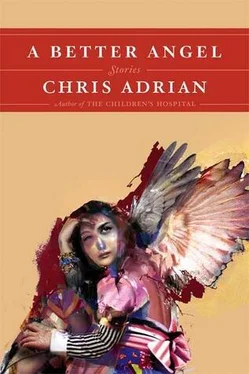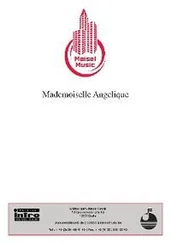I don’t stop even to get my meds — Nancy trots beside me and pushes them on the fly. Just after that, around one o’clock, I understand that I am following after something, and that I had better speed up if I am going to catch it. It seems to me, who should really know better, that all the late, new sadness of the past twenty-four hours ought to count for something, ought to do something, ought to change something, inside of me, or outside in the world. But I don’t know what it is that might change, and I expect that nothing will change — children have died here before, and hapless idiots have come and gone, and always the next day the sick still come to languish and be poked, and they will lie in bed hoping not for healing, a thing which the wise have all long given up on, but for something to make them feel better, just for a little while, and sometimes they get this thing, and often they don’t. I think of my animals and hear them all, not just the cat but the whole bloated menagerie, crying and crying, make it stop .
Faster and faster and faster — not even a grieving short-gut girl can be forgiven for speed like this. People are thinking, She loved that little girl , but I am thinking, I will never see him again . Still, I almost forget I am chasing something and not just flying along for the exhilaration it brings. Nurses and students and even the proudest attendings try to leap out of the way but only arrange themselves into a slalom course. It’s my skill, not theirs, that keeps them from being struck. Nancy tries to stand in my way, to stop me, but she wimps away to the side long before I get anywhere near her. Doctors and visiting parents and a few other kids, and finally a couple of security guards, one almost fat enough to block the entire hall, try to arrest me, but they all fail, and I can hardly even hear what they are shouting. I am concentrating on the window. It’s off the course of the circle, at the end of a hundred-foot hall that runs past the playroom and the PICU. It’s a portrait frame of the near tower of the bridge, which looks very orange today, against the bright blue sky. It is part of the answer when I understand that I am running the circle to rev up for a run down to the window that right now seems like the only way out of this place. The fat guard and Nancy and a parent have made themselves into a roadblock just beyond the turn into the hall. They are stretched like a Red Rover line from one wall to the other, and two of them close their eyes, but don’t break, as I come near them. I make the fastest turn of my life and head away down the hall.
It’s Miss Margaret who stops me. She steps out of the playroom with a crate of blocks in her arms, sees me, looks down the hall toward the window, and shrieks, “Motherfucker!” I withstand the uncharacteristic obscenity, though it makes me stumble, but the blocks she casts in my path form an obstacle I cannot pass. There are twenty of them or more. As I try to avoid them I am reading the letters, thinking they’ll spell out the name of the thing I am chasing, but I am too slow to read any of them except the farthest one, an R, and the red Q that catches under my wheel. I fall off the pole as it goes flying forward, skidding toward the window after I come to a stop on my belly outside the PICU, my central line coming out in a pull as swift and clean as a tooth pulled out with a string and a door. The end of the catheter sails in an arc through the air, scattering drops of blood against the ceiling, and I think how neat it would look if my heart had come out, still attached to the tip, and what a distinct, once-in-a-lifetime noise it would have made when it hit the floor.
My father warned me that sadness cleaves to sadness, and that depressed people go around in hangdog packs. Common disaster is the worst reason for a friendship. In picking your friends, he said, you should consider what great things you can do together. You are assembling a team, he told me, not a teatime cozy of crybabies, and he made me promise never to become part of any orphans’ or bereaved sons’ club, because sitting around in a circle of pity getting your worst qualities praised and reinforced was no way to move ahead with a great life. That is the way down , he said, making a down-roller-coaster motion with his hand, but you shall go up .
So I knew what it was all about, when Cindy Hutchinson started paying nice attention to me after her father died. He was the richest man in town and was doubling his money at the World Trade Center when the planes hit. Cindy became a tragic celebrity, and suddenly everybody remembered that my father had died when we were all in tenth grade, and the teachers all looked at me in the silences that fell during the frequent breaks they provided for us to talk about our feelings, as if I were somehow more grown-up than everybody else because my life had sucked harder and earlier than most. Or like I must have learned something back then, and if I would only share, it would make it easier for them all to bear up in these days. But I just stared at my desk, because I didn’t know anything like that.
I caught Cindy looking at me in class or at lunch, and a couple of times she came to games and I would feel an itching on the back of my neck in the middle of a play and look up to see her there. But she didn’t actually talk to me until the middle of October, and I never tried to talk to her, though like everyone else I felt bad about her dad. She was always surrounded by friends or admirers and seemed like she was getting enough sympathy to last anybody a lifetime, so I stayed away.
One afternoon after school while I was walking down to the lacrosse field I saw her with her friends, playing around on the statues outside the library. She ran after me when she saw me, but she didn’t catch up till I was passing the gym. “Hey!” she said, and I stopped and turned around.
“Hey,” I said, and then she just stood there, pulling at her skirt and touching the pencil that was stuck in her hair and looking at the divers falling past the windows in the gym. “Yeah,” I said, because I didn’t know what to say to her. “See you later.”
“I know how you feel,” she said suddenly, spitting the words out all at once and stringing them together in a swift mumble, but I’d heard the phrase so many times before that I think I’d understand it if somebody said it to me in Chinese.
“No you don’t,” I said, and walked away. Her hand was only touching my bag and she just let it drop away.
“I’m having a party tonight!” she called out after me. “You should come!”
“I don’t really go to parties,” I said, which was true. I didn’t like to drink, and didn’t like watching people get drunk, and the people I wanted to make out with were never the people who wanted to make out with me, and if I wanted to make some drunk girl cry then I could stay home and do that with my mother.
But I did go, and maybe that was the first sign, that weird pressure I felt all through practice and at home while I made dinner and while my mom watched me eat, not touching what was on her plate except to push up the potatoes in heaps, and to take strings of chicken off the bone to dangle for the dog. I was thinking of Cindy and her party all afternoon, and in the shower after practice I stood with my eyes closed under the water like I always do and felt like I was spinning in place, my bare feet turning on the soap-slicked tile, and when I opened my eyes I found I had turned to face south, down toward the river and her house. I almost never feel like I have to do something, but when I do, it usually turns out to be the right thing — I’ll pass the ball to someone who looks like they’re covered or pick an answer on a test that I think is wrong but feel is right, and it always works out.
Читать дальше












